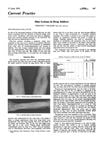5 citations,
May 2018 in “Therapeutic advances in drug safety” Androgen use may increase the risk of stroke, but more research is needed.
[object Object] 1 citations,
December 2023 in “Molecules/Molecules online/Molecules annual” JAK inhibitors show promise for treating various skin diseases.
 December 2024 in “International Journal of Molecular Sciences”
December 2024 in “International Journal of Molecular Sciences” Human umbilical cord stem cell vesicles may help treat aging and related diseases.
 December 2024 in “Journal of Cosmetic Dermatology”
December 2024 in “Journal of Cosmetic Dermatology” Exosomes from platelet-rich plasma may help heal wounds but need more research for hair growth and skin use.
 December 2023 in “Aggregate”
December 2023 in “Aggregate” Scientists are using clumps of special stem cells to improve organ repair.

Umbilical cord blood is a valuable source of stem cells for medical treatments, but its use is less common than other transplants, and there are ethical issues to consider.
 56 citations,
June 1970 in “The BMJ”
56 citations,
June 1970 in “The BMJ” Drug addicts often have scars, skin color changes, blocked veins, and bruising, with severe ulcers from barbiturate injections.
 5 citations,
September 1989 in “Journal of The American Academy of Dermatology”
5 citations,
September 1989 in “Journal of The American Academy of Dermatology” Talc in street cocaine can cause immune-reactive skin nodules where injected.
 34 citations,
January 1989 in “Toxicologic Pathology”
34 citations,
January 1989 in “Toxicologic Pathology” A study found that minoxidil can damage the hearts of dogs and pigs, cautioning its use in humans.
 3 citations,
December 2001 in “Irish Journal of Psychological Medicine”
3 citations,
December 2001 in “Irish Journal of Psychological Medicine” Trichotillomania is a challenging-to-treat impulse-control disorder where individuals pull out their hair, more common in females, with some treatments showing benefits.
 3 citations,
May 1980 in “American Journal of Nursing”
3 citations,
May 1980 in “American Journal of Nursing” Scalp tourniquets did not significantly prevent hair loss from chemotherapy.
 172 citations,
November 1983 in “Journal of The American Academy of Dermatology”
172 citations,
November 1983 in “Journal of The American Academy of Dermatology” Chemotherapy can cause skin problems like hair loss, mouth sores, and skin darkening, and recognizing these can affect treatment decisions.
 107 citations,
December 2003 in “Dermatologic Therapy”
107 citations,
December 2003 in “Dermatologic Therapy” Interferon, especially alfa interferon, is an effective treatment for cutaneous T-cell lymphoma with manageable side effects.
[object Object]  67 citations,
January 2022 in “Theranostics”
67 citations,
January 2022 in “Theranostics” Advanced nanocarrier and microneedle drug delivery methods are more effective, safer, and less invasive for treating skin diseases.
 11 citations,
June 2012 in “Archives of Dermatological Research”
11 citations,
June 2012 in “Archives of Dermatological Research” L-cystine and vitamin B6 at high doses prevented hair loss in mice treated with a chemotherapy drug.
 March 2021 in “Clin-Alert”
March 2021 in “Clin-Alert” The FDA warned about safety issues with remdesivir and tofacitinib, finasteride is linked to suicidality, potent topical corticosteroids increase osteoporosis risk, henna can cause hemolysis in G6PD deficiency, chemotherapeutic agents can cause adverse reactions, drug interactions are common in cancer patients, ketamine can reduce at-risk drinking, high dose of anticholinergics increases dementia risk in Parkinson's patients, and prenatal exposure to second-generation antipsychotics increases pregnancy complications.
4 citations,
January 2020 in “Skin appendage disorders” Toxic metals can cause hair loss and should be considered by doctors.
 1 citations,
June 2023 in “Genes”
1 citations,
June 2023 in “Genes” Hair loss from Alopecia Areata is caused by both genes and environment, with several treatments available but challenges in cost and relapse remain.

Different botulinum toxin products and concentrations can effectively reduce sweating, itching, bladder pressure, hair loss, and muscle spasms.
 19 citations,
October 2013 in “Headache: The Journal of Head and Face Pain”
19 citations,
October 2013 in “Headache: The Journal of Head and Face Pain” The document concludes that inhalation of oxygen and sumatriptan injections are primary for cluster headaches, indomethacin for paroxysmal hemicrania, and lidocaine and lamotrigine for SUNCT, but SUNCT often resists treatment.
Injecting patients' own PRP into their thyroid improved thyroid function and symptoms in most hypothyroidism cases.
 2 citations,
September 2011 in “Pediatric Dermatology”
2 citations,
September 2011 in “Pediatric Dermatology” The document suggests there might be a link between Kawasaki Disease and Alopecia Areata that needs more research.
 November 2018 in “Springer eBooks”
November 2018 in “Springer eBooks” Children need early diagnosis and treatment for iron-deficiency anemia to prevent learning problems and promote health.
1 citations,
January 2013 in “International journal of trichology” The treatment using phenol and dexamethasone was effective for alopecia areata with no recurrence in 6 months.
 13 citations,
June 2019 in “Case reports in dermatology”
13 citations,
June 2019 in “Case reports in dermatology” Fat injections in the face can cause hair loss.

TCA injections are more effective and safer than cryotherapy for treating alopecia areata.
 2 citations,
June 2019 in “Serbian Journal of Dermatology and Venereology/Serbian Journal of Dermatology and Venerology”
2 citations,
June 2019 in “Serbian Journal of Dermatology and Venereology/Serbian Journal of Dermatology and Venerology” Platelet-rich plasma injections can effectively treat stubborn alopecia areata.
 July 2024 in “JAAD Case Reports”
July 2024 in “JAAD Case Reports” Corticosteroid injections for hair loss may cause eye problems, so caution is needed.
 June 2019 in “The Egyptian Journal of Histology”
June 2019 in “The Egyptian Journal of Histology” Hyaluronic acid injections improve skin thickness and quality, protecting against aging in rats.
 11 citations,
January 2016 in “Journal of clinical & experimental dermatology research”
11 citations,
January 2016 in “Journal of clinical & experimental dermatology research” Substance abuse can cause various skin problems, including marks from injections, sores, premature aging, and increased cancer risk.
























